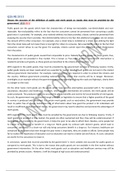Q2b MJ 2011
Discuss the accuracy of the definition of public and merit goods as ‘goods that must be provided by the
government’. [12] 12/12
Public goods are the goods which have the characteristic of being non-excludable, non-diminishable and non-
rejectable. Non-excludability refers to the fact that the consumers cannot be prevented from consuming a public
good once it is provided. For example, once national defence has been provided, citizens cannot be prevented from
enjoying the security that it provides. Non-diminishability refers to the fact that additional consumers do not reduce
the amount left for other consumers. For example, once a street lamp is installed on a street, one utilizing the light
from the street lamp will not mean there is less light for others to consume. Non-rejectability refers to the fact that
consumers cannot refuse to use the good. For example, citizens cannot reject the protection which they receive
from the police.
The characteristics of public goods caused them impossible to price. Nobody is willing to pay for these goods, thus,
these goods are not provided in free market. This is known as ‘free-rider’ problem. Government intervention is
needed to provide such goods, as these goods are beneficial to the citizens of the country.
With regards to the public goods, they must be provided by the government are due to following reasons. Firstly,
public goods mainly are basic needs which are essential for overall. Besides, such goods are not exist in the market
without government intervention. For example, national defence are required in order to protect the citizens and
the country. Without government providing national defence, clearly that country will be in danger. Moreover,
streetlights as an example without the government providing streetlights along the roads and highways, clearly there
is a danger on the road.
On the other hand, merit goods are the goods which have positive externalities associated with it. For example,
vaccination, education and healthcare. However, when positive externalities are present, the merit goods will be
under-produced. The producers take into account the private benefits and not the full social benefits of merit goods.
As such, the government may intervene through subsidies or legislation to ensure that a higher quantity of the good
or service is produced and consumed. For certain merit goods such as vaccination, the government may provide
them to public free of charge. Sometimes lack of information about how good the product is for individuals will
result in insufficient market demand. Hence, the government may need to advertise and promote the advantages of
merit goods.
With regards to the merit goods, they must be provided by the government are due to following reasons. Firstly, if
merit goods are provided in free market, the goods are often overpriced and thus, they will be underconsumed. If
merit goods are provided by the government, it helps the poor to be able to afford them. Besides, some people fail
to realise its importance or benefit in a long-run. Merit goods by contrast with demerit goods, which lead to
consumers’ satisfaction in a short-run will only bring consumers benefit in a long-run. For instance, healthcare are
overpriced to the extent that even though the poor knew is important, they are unable to afford. Some people may
fail to realise the importance of education such as education can lead to a better job and future. As such, education
are worth for the consumers to invest in.
In conclusion, ‘goods that must be provided by the government’ is more suitable and accurate for public goods as
compared to merit goods. This is due to the reason that public goods are not available in the free market without
government intervention. On the other hand, merit goods such as education and healthcare services may still be
provided by private sectors. However, it will be charged at high costs and underconsumed.






